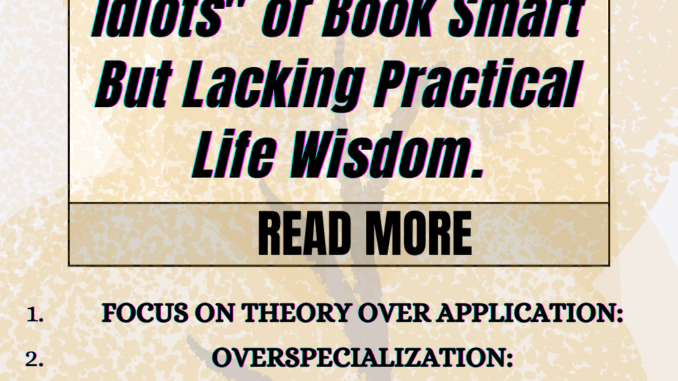
Reasons Why Some Individuals May Be Considered “Educated Idiots” or Book Smart But Lacking Practical Life Wisdom.
Introduction
Educated Idiots. In today’s society, it is not uncommon to encounter individuals who possess impressive academic credentials and intellectual knowledge but seem to lack practical life wisdom. These individuals, often labeled as “educated idiots,” demonstrate a stark contrast between their book smarts and their ability to navigate real-life situations effectively.
It is important to note that while some individuals may appear as “educated idiots,” it is generally a simplification to judge someone solely based on their academic achievements. Intelligence and wisdom come in various forms, and a person’s value should not solely be determined by their educational background.
In this article, we explore some key reasons behind this phenomenon and shed light on the potential pitfalls of focusing solely on academic achievement.
1. Lack of Emotional Intelligence
One of the primary reasons why some educated individuals struggle in practical life is their limited emotional intelligence. While they may excel in theoretical concepts, they find it challenging to understand and navigate complex human emotions, leading to poor interpersonal skills and decision-making.
2. Overreliance on Memorization
Many education systems emphasize rote memorization rather than critical thinking and problem-solving skills. This overemphasis on memorization can hinder individuals’ ability to apply their knowledge to real-world situations, leaving them ill-equipped to deal with the complexities of practical life.
3. Limited Exposure to Real-Life Challenges
Education often takes place within the controlled environment of classrooms, limiting exposure to real-life challenges. In addition, this lack of hands-on experience can create a disconnect between theoretical knowledge and its practical application, resulting in educated individuals struggling to adapt when faced with real-world problems.
4. Narrow Focus on Specialized Areas
Specialization is a common feature of higher education, which encourages individuals to delve deeply into specific subjects. However, this narrow focus can lead to a lack of interdisciplinary knowledge and an inability to connect the dots between different fields, impairing holistic understanding and practical problem-solving abilities.
5. Inadequate Critical Thinking Skills
While education aims to foster critical thinking, some individuals may fall into the trap of regurgitating information rather than truly understanding and analyzing it. This can lead to a superficial understanding of concepts and an inability to think critically and independently in practical situations.
6. Lack of Practical Application
A significant factor contributing to the “educated idiot” phenomenon is the absence of practical application in traditional education systems. Without opportunities to apply their knowledge in real-world scenarios, individuals may struggle to bridge the gap between theory and practice.
7. Ignoring Practical Life Skills
The relentless pursuit of academic excellence often results in neglecting essential practical life skills. Notably, individuals may excel academically but lack fundamental abilities such as financial literacy, communication skills, or problem-solving skills required for success in everyday life.
8. Overconfidence in Academic Achievements
Educated individuals may develop overconfidence in their academic achievements. This leads to a disregard for practical knowledge and experiences. In addition, this arrogance can hinder their ability to learn from others, adapt to new situations, and make sound judgments outside the realm of academics.
9. Limited Exposure to Diverse Perspectives
Educational institutions may inadvertently limit exposure to diverse perspectives and real-life experiences. This, therefore, can hinder the development of empathy, open-mindedness, and the ability to understand different viewpoints. This narrow-mindedness can prevent individuals from effectively engaging with the world around them.
10. Failure to Recognize the Value of Lifelong Learning
Some educated individuals may mistakenly believe that formal education is the ultimate source of knowledge and stop actively pursuing learning outside of academic settings. Moreover, this mindset can lead to stagnation and a failure to adapt to the ever-evolving demands of practical life.
Conclusion
While academic achievements and intellectual knowledge are undoubtedly valuable, they should not be the sole measure of a person’s wisdom or success in life. It is crucial to recognize the limitations of traditional education systems and strive for a more holistic approach that integrates practical skills, critical thinking, emotional intelligence, and exposure to diverse perspectives. In addition, by bridging the gap between book smarts and practical wisdom, individuals can become more well-rounded, adaptable, and effective contributors to society.
It’s important to remember that intelligence and wisdom are not the same thing. Intelligence is the ability to learn and understand new information, while wisdom is the ability to use that information to make good decisions and live a good life. You can be intelligent without being wise, and you can be wise without being intelligent.
If you want to be wise, it’s important to balance your academic learning with real-world experience. You also need to develop your emotional intelligence and broaden your view of the world. By doing these things, you can become a well-rounded individual who is both intelligent and wise.
Here are some additional tips for developing practical life wisdom:
- Spend time with people who are different from you. This will help you to broaden your perspective and learn new things.
- Travel and experience different cultures. This will help you to see the world from different perspectives and learn to appreciate different ways of life.
- Read widely and non-fictionally. This will help you to learn about different topics and gain a deeper understanding of the world.
- Reflect on your experiences and learn from your mistakes. This will help you to grow and become a wiser person.
Wisdom is a lifelong journey, and there is no one right way to achieve it. However, by following these tips, you can start to develop the practical life wisdom that you need to succeed in life.
Other Articles That Might Interest You;
Signs You’re Being Played By A Woman
Understanding Why Chasing Isn’t Always the Answer
The Key to a Successful Relationship
Benefits Of Keeping Your Life Private
Understanding When Couples Counseling Can Be Beneficial
1 Trackback / Pingback
Comments are closed.